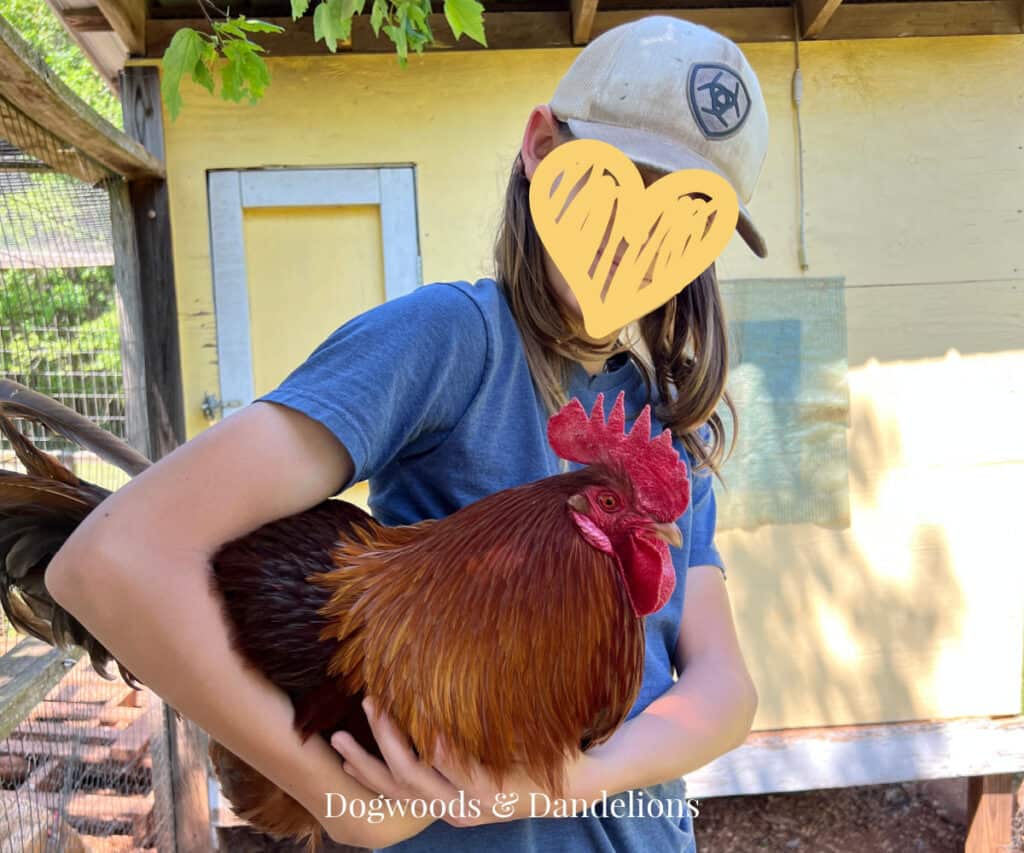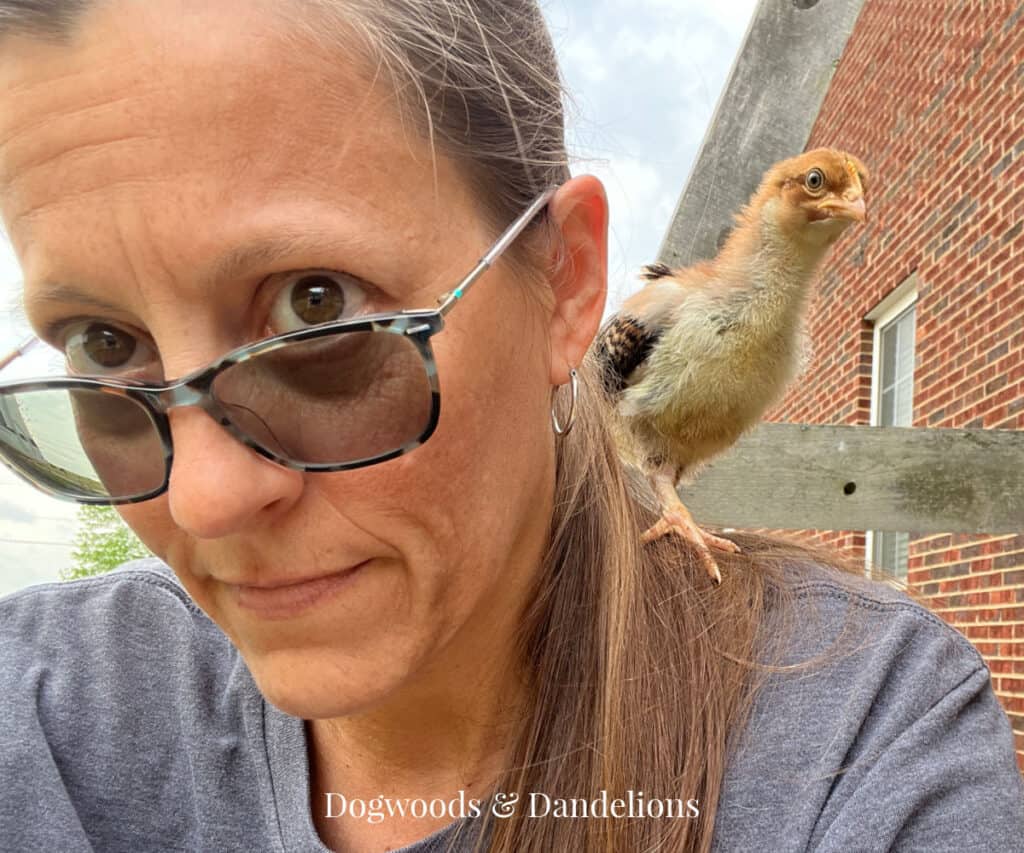How to Get Chickens to Like You
Inside: You’ll find ways to get your chickens to like you and be friendlier towards you and your family.
If you just have a small backyard flock of hens, you may prefer to have friendly chickens that you treat more like pets. Especially if you have young children, you don’t want to be dealing with mean hens and roosters that chase your small humans.
And we’ve all heard stories of chickens attacking people. Even my youngest son has a story about being attacked by a rooster when he was just 2 years old.
But there are several things you can do to encourage friendly chickens and get your chickens to like you better.

Affiliate Disclosure: Please note that some of the links in this article may be affiliate links and I may receive a small commission if you purchase something through a link. It will not change your cost. As an Amazon Associate, I earn from qualifying purchases. For more information, see my disclosures page.)
Why Would You Want Your Chickens to Like You?
First, let’s address the question “Why would you want your chickens to like you?” And actually, there are quite a few reasons you might want your feathered friends to like you, besides just making pets out of your birds.
One reason is that having friendly chickens makes caring for your flock easier. You aren’t going to be scared to feed and water your birds if they are friendly.
Secondly, if your chickens like you they are much easier to pick up and inspect for signs of mites, sour crop, or other illnesses. And if you need to pick up a chicken for medical treatment or to provide first aid, it will be much easier to handle if it is used to you.
Finally, if you let your flock free range and a bird doesn’t go back to the chicken coop on its own, it will be much easier to catch if it is friendly and will come when called.
Choosing Friendly Breeds is the Most Important Thing You Can Do to Get Your Chickens to Like You
One of the best ways to get your chickens to like you is to start out with friendly chicken breeds. Some breeds are very skittish and aren’t likely to be friendly no matter what you do.
But other breeds tend to be friendlier from the beginning and are easier to tame and pet. Breeds like the Buff Orpington, the Wyandotte, and the Speckled Sussex are known to be friendlier than Leghorns or Rhode Island Reds.
And ornamental birds with large crests like Polish and Silkies tend to be less friendly. They can’t see well because their feathers get in their eyes so they are generally more timid than other breeds.
Read More: Friendliest Chicken Breeds
Choosing friendly chicken breeds is the best way to ensure that your backyard flock will grow to like you and be easy to handle.
Handle the Chicks While They Are Young

Picking up and handling the chicks while they are small will allow them to get used to human interaction. From the day you bring them home it is a good idea to gently pick up each chick.
I do advise against handling them too much the first few days you bring them home. They are likely stressed from travel if you purchased them online or bought them from a feed store.
However, you do need to pick all day-old chicks up at least once to inspect for pasty butt and keep checking them for a clogged vent first few weeks.
But from the first week on, pick each little chick up on a regular basis and gently stroke its back and talk softly to it. Let the chicks get used to you and the sound of your voice from a young age.
Always keep your chickens away from your face, even as young chicks. Many a chicken has been known to peck at an eye. This can be especially dangerous with small children that want to hug them close.
Remember to wash your hands each and every time immediately after you handle your chicks.
Talk Softly to Your Flock
While you are holding your little chicks, talk softly to them. They will obviously have no idea what you are saying but they will pick up on your tone of voice.

Eventually, they will recognize your voice and may even come when you call. Several of our flock members know their names.
It is entirely possible that they are more aware of the cadence of the word rather than their actual name. But we do have several hens and a rooster that will immediately pop out of the coop or over to the fence if you call for them by name.
Feed Chickens Treats to Get Your Chickens to Like You
Chickens love treats and this will help endear you to them. However, giving too many treats may slow egg production so only give treats in moderation. Treats should make up less than 10 percent of a chicken’s diet.
The best way to give your flock treats is to throw out the treats on the ground and say the same words each time. This will allow them to start to recognize those words and know to come to you when they hear them.

And if you are wondering what are good chicken treats? Some of the best treats to give your backyard hens are scratch, food scraps, and live meal worms.
A good rooster will typically not eat many of the treats. Instead, he will alert his ladies to come to get the treats and may take just a bite or two if he sees there is enough to go around.
If you give your flock a small handful of treats on a daily basis, and say the same words each time they will gradually start to pick up on the words you are using. Eventually, they will come when called regardless of whether or not you have treats to give out.
And getting your flock used to coming to you when called can also be helpful if you need to put them up in a hurry. An impending storm or a predator appearing in your yard are just a few of the reasons you might need to put your flock up quickly.
And if your flock is used to coming when called, it will be much easier on you to get the birds back inside their coop and run.
Provide Your Flock With Food & Water
You should always provide your flock with clean water. A balanced feed should also be available to your chicken flock at all times.

Even if your flock free ranges all day, you should still provide laying pellets or crumbles to ensure adequate nutrition. And have several fresh water stations spaced around your free range area so your flock doesn’t have to travel too far to get water.
It is also a good idea to provide chick grit for your younger chickens and poultry grit for your adult birds, especially if they aren’t allowed outside the coop and run. This helps them to digest any treats you give them.
Read more: Do You Need Grit for Your Backyard Flock?
By not meeting your flock’s nutritional needs, your hens and roosters will be less likely to be friendly and may even be aggressive toward you. Similar to humans, when chickens are sick, they don’t like to be messed with.
Be Extra Careful Around Mama Hens
If you had a broody hen hatch out your new chicks, be careful around the mama hen until you see how she will react to your presence around her babies.
Some mother hens will be totally fine with you picking up and mingling with her baby chicks. Others can turn mean and peck you with a vengeance. Even if the hen is normally friendly towards you, she may have a whole different attitude with her chicks around.
So if you have baby chicks that hatched from a mother hen, proceed slowly until you see how she will react.
A Few Things to Avoid When Trying to Get Your Chickens to Like You
There are a few things to avoid when you are trying to tame your chickens.
Avoid Sudden Movements
Quick movements are likely to scare chickens and make them skittish. As you mingle with your backyard flock, take small, deliberate steps and use slow movements.
Don’t sneak up on your flock. If you are approaching your chickens and they aren’t aware of your presence it is a good idea to talk to them and announce your arrival.
If you’ve been talking to them each day, they should recognize your voice and may even come running to see you.
Avoid Loud Noises
Like sudden movements, chickens dislike loud noises. So try to avoid hollering or screaming around your flock.
A Few Final Reminders
Years ago, I heard that chickens can recognize up to 100 human faces. I don’t know where I saw that statistic now or how the experts determined the number of people chickens can recognize, but that fact has stuck with me for many years.
In my own flock, I can say that it is definitely true that they can recognize different family members. Even though 2 of my boys look similar, my adult chickens know which boy is their regular chicken keeper.
Spending lots of time with your chicks from an early age is a great way to create a stronger bond with your flock.
Just remember that no matter what you do, some chickens may never be great pets. And there is a good chance that some hens will always be friendlier than others. Some backyard chickens may never welcome human contact no matter how hard you try to get them to like you.
Related Posts
- How to Deal with a Bully Chicken
- Ways to Protect Your Chickens from Hawks
- What to Name Your Chickens

Meet Julie
I’m a farm girl born and bred in North Carolina. I’ve been growing a vegetable garden for over 20 years (and helping my Mom grow hers even longer). I’ve been raising chickens in my bathtub and backyard for 12+ years. I believe that homegrown food can be made simple. Let’s get started.


